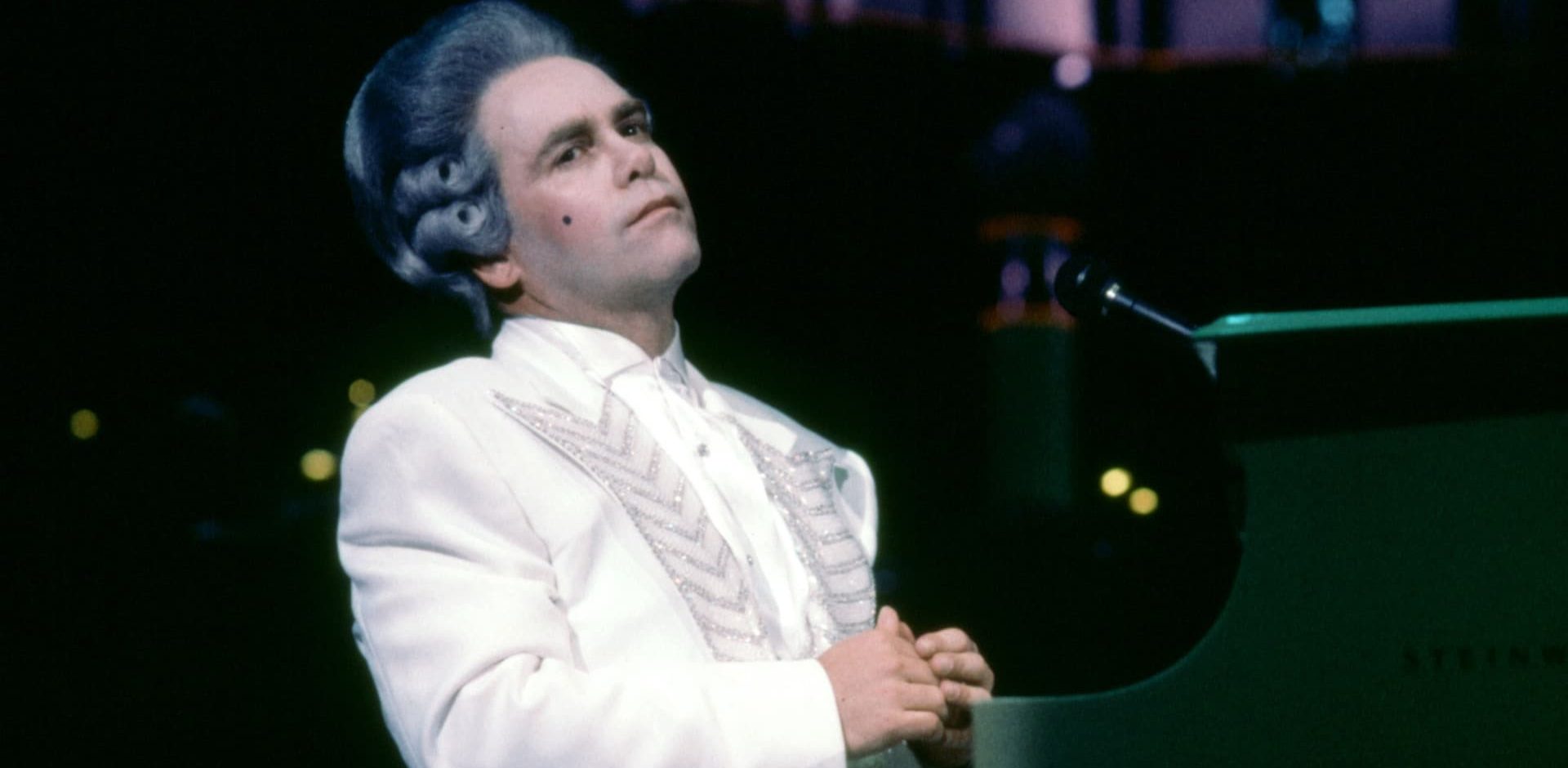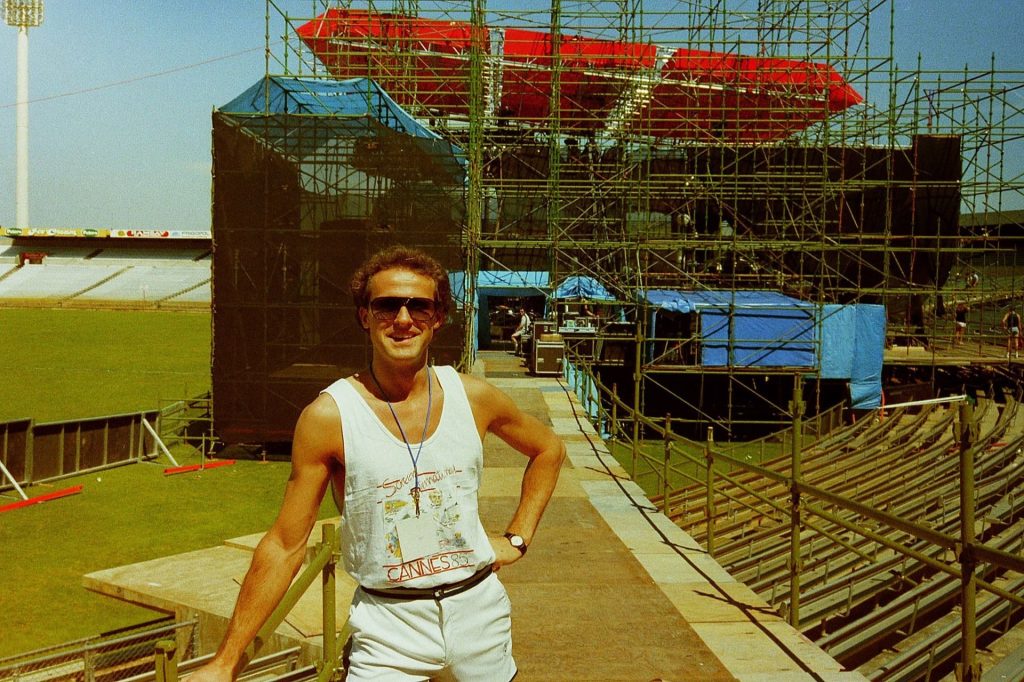Menu
Elton’s ‘Tour de Force’ Remembered
From November 5 to December 14, 1986, Elton toured Australia with his 14-member band…augmented by the 88-piece Melbourne Symphony Orchestra (MSO) and conductor James Newton Howard, who had played keyboards in Elton’s band from 1975 to 1981.
In Part One of this two-part tribute to the unprecedented “Tour de Force,” which resulted in the 1987 album Live In Australia with the Melbourne Symphony Orchestra, band members Fred Mandel (keyboards and guitar) and Charlie Morgan (drums) speak with EltonJohn.com about their memories of the tour.

EltonJohn.com: When you were first told of this idea, what was your reaction?
Fred Mandel: I thought it was great. It was a logical conclusion to the original Paul Buckmaster arrangements that had been done. To incorporate them live I thought made a lot of sense and I was looking forward to it.
Charlie Morgan: I remember we were all a bit worried about this meeting of the ways of the two different styles of music.
FM: At the first rehearsal we were hearing rumors that certain members did not want to play with us because of our standing as rock musicians. But by the end of the tour they’re all wearing Elton hats and glasses and standing up and everything. So we transformed their whole concept of “rock musicians”.
CM: I remember towards the end of the first day of rehearsals we’re in the middle of Saturday Night’s Alright (For Fighting) and I look up to my right and there’s a viola player, quite a young girl, sitting there with her viola on her lap…and she’s doing this [rocking back and forth to the beat]. And I thought, “We’re ok. We’re all right.”
FM: One down, eighty-seven to go. [laughter]
EJ.com: So by the time the Brisbane rehearsals ended three days later…?
CM: Well, we were just making sure everything did gel and we in fact knew our stuff. There were a certain number of songs that the band were playing that we hadn’t before. James had written some really good charts. I do remember I got some proper drum charts. They were really nice, and beautifully copied out.
EJ.com: Fred, before the orchestral tour, you had spent a year playing the horn parts and string parts on a great many of these songs.
FM: Yeah, I switched to kazoo and bagpipe, if I’m not mistaken [laughter]. I still played some of my parts, but I tried to stay out of the way as much as I could. I did change some things around; I played organ sometimes when I used to play strings. And I went from doing some other stuff to playing the steel guitar part in Tiny Dancer. [Having the orchestra there] gave a whole new meaning to the concept of a string sample for me.
EJ.com: Elton’s live sound engineer Clive Franks had some help on this tour, in the form of Elton’s producer Gus Dudgeon.
FM: Gus and Clive are to be commended because Gus determined a microphone system for all of those instruments, which was sent out to Clive at the front of the house. Between these two guys, they actually accomplished the sonic elements of what was going on translated into a recording and out front. That was a big task.
CM: All of what the orchestra played was going back to a mobile studio behind the stage. Gus was sub-mixing the entire orchestra to two tracks.
FM: Which simplified the whole procedure, because it meant the orchestra was just another two-track, stereo instrument for Clive, instead of over 88 channels! So he could bring it up or down…or phase it or pan it back and forth in certain tunes. Unfortunately, Gus is gone, which is a real great loss. But he did leave behind some historic stuff. I loved working with Gus.
CM: He had tremendous attention to detail. And he also had incredible patience and he really knew Elton well, just in general, I think. It’s no coincidence that all of the best albums were recorded with Gus.
FM: Absolutely. I agree 100%.

Charlie Morgan in Adelaide – 1986
EJ.com: Elton was going through some vocal troubles on that tour.
FM: He was getting vocal nodes. I remember when he came out and talked to us and he was saying, “I think I have throat cancer.” He was very worried.
CM: He had the operation the day after the last show.
FM: It turned out to be vocal nodes. I’ll tell you, he certainly soldiered on through that. And I mean…Elton singing with nodes is better than a lot of people. At his worst, he still is a pretty damn good singer.
CM: I do have a very vivid memory. We are playing Don’t Let The Sun Go Down On Me and I look over at Elton and I realize that there are tears streaming down his face as he’s singing the chorus. I think that the thought that he was going into hospital and didn’t know what the hell was going on was…
FM: …he thought it might be the last time he would sing that song.
CM: It was really hitting him. When I looked over it wasn’t sweat, it was tears.
FM: He was in tears when he came and told us he thought it might be cancer. I actually think it was a pretty incredible thing that he was able to soldier on through that, because that would be a psychological roadblock for a lot of people.
CM: And for 26 shows! You think about that…that’s pretty awesome, really.
FM: And [the band] weren’t on for the whole time. But he was was onstage from beginning to end for three-and-a-half hours. It’s a big problem for any artist to do an hour and a half to two hours. Not only that, but you’ve got to stick to the arrangements. You can’t just turn around, “Ok guys, let’s jam. String section, take it!” It doesn’t work like that.
CM: He was basically getting his voice back in shape in the middle of One Horse Town each night. He was getting the phlegm out of his voice.
EJ.com: Yet songs like Rocket Man clocked in at something like 13 minutes!
CM: That was the final version of a track that had taken almost 18 months to develop. It started off maybe being six or seven minutes and then we had two key changes in it and the brass would come in and all kinds of stuff. All the ad-libs had been tagged on, one by one. The final version of Rocket Man was the result of 185 previous shows.
FM: That song was evolving a lot. And Elton and I used to do [Leon Russell’s] A Song For You…just the two of us. Elton wasn’t even playing, he just sang. I can’t recall the setup exactly but I was playing my enhanced Rhodes sound, so it might have been my Yamaha and maybe the DWX, which had a more ringing quality on top.
EJ.com: And you took the guitar solo on The Bitch Is Back.
FM: Well I was a rock and roll guitar player too. Davey and I had played together with Alice Cooper’s band, with Dee [Murray]. That’s where I met Davey. I always liked his guitar playing. The greatest orchestrated guitar playing – very underrated sort of a George Harrison personality in a lot of ways, what he did with Elton. He knows what to play…and he doesn’t shred. Elton used to call me “Heavy Metal Fred” because I would play a little harder. I came out of Alice’s band and it took me a while to back that down a little bit, not playing that kind of stuff.
EJ.com: Just before Take Me To The Pilot on the final night, Elton turns to you and says, “Hi Fred.”
FM: Yeah, that was just a thing we used to do every once in a while. It’s just our sense of humor, kind of dry but also absurd. I mean, you have a giant orchestra, an extremely formal situation, hundreds of musicians onstage and thousands in the audience and you just say “hi” into the microphone like we’re performing at the local high school doing a sock hop.
EJ.com: What was the mood after you’d had a show or two under your belt?
CM: I think we all felt it was a big success
FM: Yeah, that’s because it was!
CM: I have to say it was just absolutely astounding, playing some of those songs that we never normally played, like Have Mercy On The Criminal, which is just such an epic tune. Also playing Madman Across The Water and Take Me To The Pilot with the orchestra.
FM: Tumbleweed Connection was my favorite album when I grew up. I mean, Elton was a big influence on me…so not only was it an honor, but it was beyond reality. I saw him in ’74 in Toronto and ten years later I was playing in the band! But it was fun to be able to be so close to him on stage and watch how he steam-powered that engine.
CM: I remember Genesis was playing the SEC after us, and they came to see our last show. Because they had to play three nights after we had just played 12 nights of completely ground-breaking orchestral stuff. And as we came off stage, Phil Collins jumped down next to me and walked backstage with us and…he turned to me and said, “Well, Charlie…how the f*ck do we follow that??”
